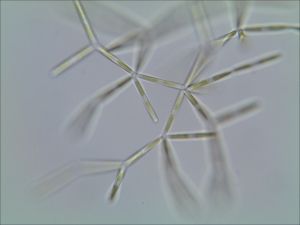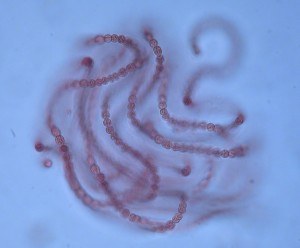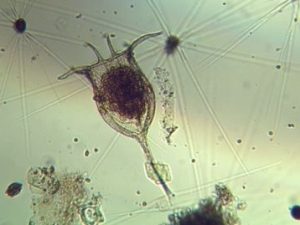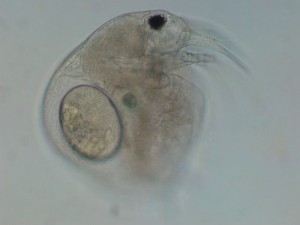Plankton
Underwater, hidden from our eyes, is the peculiar world of plankton. Its inhabitants are so small that you need a microscope to see them. Or you could get to know them on this website. 🙂
You see, an unfathomable number of tiny microscopic plants and creatures


live in water.


The name plankton means one who drifts freely in water. It comes from the Greek word ‘planktos’.
There are lots of different kinds of plant plankton, such as green algae, golden algae, diatoms, sea fire, and blue-green algae. Blue-green algae are technically considered bacteria, but are similar to algae, thus why they were considered algae in the early phases of plankton research, and the correct name is Cyanobacteria.
There are just as many different groups of animal plankton: rotifers, water fleas, and copepod are some key examples.
Just like on land, plants grow thanks to sunlight and take the nutrients they need from the water around them – they are producers. Animal plankton are thus either herbivores (vegetarians) or carnivores (meat eaters), i.e. consumers.
And, also just like on land, if they have sufficient nutrients, the plants grow. If there are enough animals, they keep the plants’ growth in check. If the water environment changes in terms of nutrients or environmental factors, the change can also be seen in the algae soon afterwards. And a little while later in the animal plankton too. This then leads to changes in fish. If there are too many nutrients, this produces a so-called algal bloom. These blooms have no flowers, but instead they turn the water a strange colour – green, brown, or even red.
By investigating the plankton, the amount, and the species, it is possible to find out all kinds of information about the state of the water – far more than is revealed by just chemical and physics research. What’s more, plankton are great fun to watch! Grab yourself a microscope!
You can read more and enjoy some more plankton images on our blog, Facebook page (planktonia), Instagram page ja Pinterest page. You can follow the adventures of our water flea heroes on their own Facebook page: https://www.facebook.com/CucuBosmina-395197117931073
